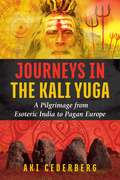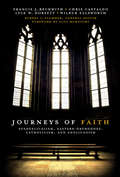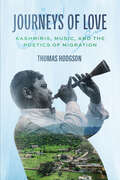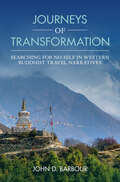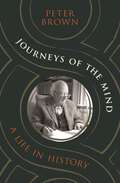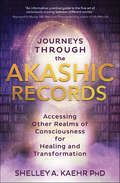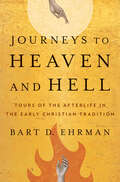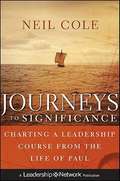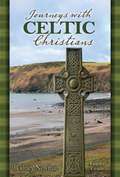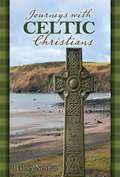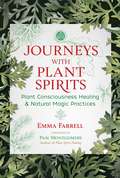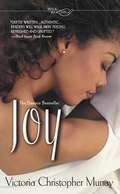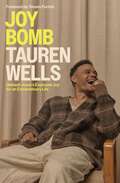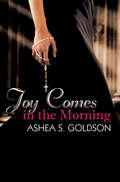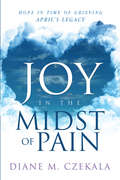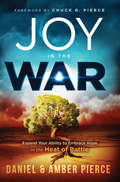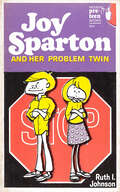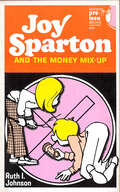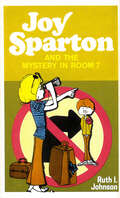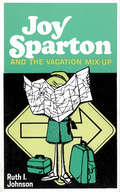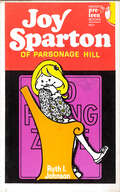- Table View
- List View
Journeys in the Kali Yuga: A Pilgrimage from Esoteric India to Pagan Europe
by Aki CederbergA beautifully evocative account of one man’s odyssey to discover authentic and unbroken magical traditions in the East and reawaken them in the West • Details the author’s encounters with the Naga Babas, his initiation into their tradition, and his experience at the Kumbh Mela, the largest spiritual gathering on Earth • Shares the similarities he discovered between the teachings of the Indian tradition and the Western traditions of magic, alchemy, and pagan pantheons • Introduces a wide cast of characters, including Goa Gil, the world-renowned guru of the Goa techno-trance scene, and Mahant Amar Bharti Ji, a “raised-arm Baba,” who for more than 40 years has held up one arm in devotion to Shiva Beautifully detailing his spiritual pilgrimage from West to East and back again, in the age of strife known as the Kali Yuga, Aki Cederberg shares the authentic and unbroken magical traditions he experienced in India and Nepal and how his search for a spiritual homeland ultimately led him back to his native Europe. Cederberg explains how his odyssey began as a search for spiritual roots, something missing in the spiritually disconnected life of the Western world, where the indigenous traditions were long ago severed by the spread of Christianity. Traveling to India, he encounters the ancient esoteric order of mystic, wild, naked holy men known as the Naga Babas, the living source of the Hindu traditions of magic and yoga. Immersing himself in the teachings of the tradition, he receives an initiation and partakes in the Kumbh Mela, the largest spiritual gathering on Earth. With his evocative descriptions, Cederberg shows how traveling in India can be an overwhelming, even psychedelic experience. Everything in this ancient land is multiplied and manifold: people and things, sights and sounds, joy and suffering. Yet beyond the apparent confusion and chaos, a strange, subtle order begins to reveal itself. He starts to glimpse resemblances and analogies between the teachings of the Indian tradition and the Western traditions of magic, alchemy, and pagan pantheons. He meets a wide cast of characters, from mystical hucksters in Rishikesh and the veritable army of naked, chillum-smoking mystics of Maya Devi to Goa Gil, the world-renowned guru of the Goa techno-trance scene, and Mahant Amar Bharti Ji, an urdhvabahu or “raised-arm Baba,” who for more than 40 years has held up one arm in devotion to Shiva. After extensive traveling and immersing himself in the extraordinary world of India, Cederberg returns to his native soil of Europe. Traveling to holy places where old pagan divinities still linger in the shadows of the modern world, he dreams of forgotten gods and contemplates how they might be awakened yet again, reconnecting the West with its own pre-Christian spiritual traditions, sacred landscapes, and soul.
Journeys of Faith: Evangelicalism, Eastern Orthodoxy, Catholicism and Anglicanism
by Scot Mcknight Robert L. PlummerIt is reported that on average Americans change their religious affiliation at least once during their lives. Today, a number of evangelical Christians are converting to Catholicism, Eastern Orthodoxy, and Anglicanism. As such, there is great need for a resource that cogently presents an evangelical response to these competing faith traditions. Evangelical Christians, however, need not only theological answers, but a deeper understanding of the obvious attraction of these varying religious expressions. JoThis ebook download of Journeys of Faith examines the theological migrations among Catholics, Eastern Orthodox, Anglicans, and Evangelicals, each of which is viewed from various angles. Three prominent evangelical converts to Eastern Orthodoxy, Catholicism, and Anglicanism describe their new faith traditions and their spiritual journeys into them. In response, chapters by recognized evangelical scholars offer civil critiques. The book also contains a chapter by a convert to Evangelicalism, followed by an appraisal of the evangelical faith by a Catholic scholar. Each contributor arguing for their new faith tradition will be allowed a brief rejoinder to those writing on the opposing side. There are basically two types of chapters in this book: First, chapters that explain and advocate theological migration from one expression of Christianity to another (e.g., an Evangelical who has converted to Catholicism and makes a case for others to do the same). These chapters focus on such issues as Why did you leave your prior theological tradition? and What is it about your new tradition that makes you feel it better represents Scripture and church history. Second, there are response chapters arguing for the greater theological fidelity of a certain expression of Christianity in light of persons leaving those traditions (e.g., Evangelicals arguing that conversions to Greek Orthodoxy or Catholicism are not moves to greater faithfulness). These chapters will provide a critique of the differing Christian traditions under discussion and address such issues as Why have you remained within your current Christian tradition? and Why beneficial lessons can be learned from the tradition you are critiquing? In all, this book will provide readers with first-hand accounts of why certain individuals have changed their religious affiliation or have remain true to the one they have always known. Pastors, counselors and general readers will gain a wealth of insight into current faith migration with the Church today.
Journeys of Love: Kashmiris, Music, and the Poetics of Migration (Chicago Studies in Ethnomusicology)
by Thomas HodgsonAn empathetic and eye-opening portrait of Muslim migrants in England that debunks many misperceptions about their music and poetry. In Journeys of Love, ethnomusicologist Thomas Hodgson offers a sensitive corrective to harmful portrayals of immigrants—specifically, Pakistanis living in England—as a self-segregating group prohibited from making music, a stereotype that has often resulted in violent Islamophobia. He argues that, in practice, these migrants—many of whom come from the Mirpur area of Azad Kashmir—occupy rich musical worlds, full of poetic metaphors, that are central to surviving migration and its attendant losses. Hodgson shows how Mirpuris in England, as well as those who remain in Pakistan, carry on traditions of reciting a collection of poetry by the nineteenth-century Sufi saint Mian Muhammad Bakhsh, translated by Hodgson here as Journeys of Love. With its themes of remaining true to one’s home, the oppressed being saved, having patience, and keeping faith in God, this work has become the story of movement and displacement in its narrative arc, as well as through the way it provides spiritual and ethical frameworks for settling in new lands. These hidden poetics of migration transform across generations as young Mirpuris develop new expressions of the connections across continents. These poetics reveal the connections between Kashmir’s rural village life and urban centers abroad, offering a sensitive and illuminating portrait of migration and multiculturalism in Britain and beyond.
Journeys of Transformation: Searching for No-Self in Western Buddhist Travel Narratives
by John D. BarbourWestern Buddhist travel narratives are autobiographical accounts of a journey to a Buddhist culture. Dozens of such narratives have since the 1970s describe treks in Tibet, periods of residence in a Zen monastery, pilgrimages to Buddhist sites and teachers, and other Asian odysseys. The best known of these works is Peter Matthiessen's The Snow Leopard; further reflections emerge from thirty writers including John Blofeld, Jan Van de Wetering, Thomas Merton, Oliver Statler, Robert Thurman, Gretel Ehrlich, and Bill Porter. The Buddhist concept of 'no-self' helps these authors interpret certain pivotal experiences of 'unselfing' and is also a catalyst that provokes and enables such events. The writers' spiritual memoirs describe how their journeys brought about a new understanding of Buddhist enlightenment and so transformed their lives. Showing how travel can elicit self-transformation, this book is a compelling exploration of the journeys and religious changes of both individuals and Buddhism itself.
Journeys of the Mind: A Life in History
by Peter BrownA beautifully written personal account of the discovery of late antiquity by one of the world’s most influential and distinguished historiansThe end of the ancient world was long regarded by historians as a time of decadence, decline, and fall. In his career-long engagement with this era, the widely acclaimed and pathbreaking historian Peter Brown has shown, however, that the “neglected half-millennium” now known as late antiquity was in fact crucial to the development of modern Europe and the Middle East. In Journeys of the Mind, Brown recounts his life and work, describing his efforts to recapture the spirit of an age. As he and other scholars opened up the history of the classical world in its last centuries to the wider world of Eurasia and northern Africa, they discovered previously overlooked areas of religious and cultural creativity as well as foundational institution-building. A respect for diversity and outreach to the non-European world, relatively recent concerns in other fields, have been a matter of course for decades among the leading scholars of late antiquity.Documenting both his own intellectual development and the emergence of a new and influential field of study, Brown describes his childhood and education in Ireland, his university and academic training in England, and his extensive travels, particularly in the eastern Mediterranean and the Middle East. He discusses fruitful interactions with the work of scholars and colleagues that include the British anthropologist Mary Douglas and the French theorist Michel Foucault, and offers fascinating snapshots of such far-flung places as colonial Sudan, midcentury Oxford, and prerevolutionary Iran. With Journeys of the Mind, Brown offers an essential account of the “grand endeavor” to reimagine a decisive historical moment.
Journeys through the Akashic Records: Accessing Other Realms of Consciousness for Healing and Transformation
by Shelley A. KaehrGuide Your Soul’s Path with the Invisible Library of Ultimate KnowledgeJourney into the divine depths of the Akashic Records and access your unique soul information. Packed with hands-on exercises—including past-life healing, psychic protection, and meeting otherworldly guides—this groundbreaking book empowers you to find meaningful answers to life's most important questions. The Akashic Records consist of all thoughts, deeds, and actions that have ever been created in the past, present, or future. Since her near-death experience in 2000, Shelley A. Kaehr, PhD, has accessed this cosmic storehouse frequently. Now she teaches you how to enter the records for yourself and shares historical examples, client stories, insights from famous seers, and more. This phenomenal book helps you heal past-life issues, reveal your soul purpose, and enjoy greater awareness and peace.
Journeys to Heaven and Hell: Tours of the Afterlife in the Early Christian Tradition
by Bart D. EhrmanA New York Times best-selling scholar's illuminating exploration of the earliest Christian narrated journeys to heaven and hell “[An] illuminating deep dive . . . An edifying origin story for contemporary Christian conceptions of the afterlife.”—Publishers Weekly From classics such as the Odyssey and the Aeneid to fifth-century Christian apocrypha, narratives that described guided tours of the afterlife played a major role in shaping ancient notions of morality and ethics. In this new account, acclaimed author Bart Ehrman contextualizes early Christian narratives of heaven and hell within the broader intellectual and cultural worlds from which they emerged. He examines how fundamental social experiences of the early Christian communities molded the conceptions of the afterlife that eventuated into the accepted doctrines of heaven, hell, and purgatory. Drawing on Greek and Roman epic poetry, early Jewish writings such as the Book of Watchers, and apocryphal Christian stories including the Acts of Thomas, the Gospel of Nicodemus, and the Apocalypse of Peter, Ehrman demonstrates that ancient tours of the afterlife promoted reflection on matters of ethics, faith, ambition, and life’s meaning, the fruit of which has been codified into Christian belief today.
Journeys to Significance
by Neil ColeA powerful, biblically based model of leadership development based on the life of the Apostle PaulAll churches, denominations, and parachurch organizations are eager for new models of leadership development. Cole uses the life and leadership lessons of the Apostle Paul to show how to develop leaders who are skilled, dedicated, and always open to learning from experience.Cole, a trusted, innovative authority, uses the four journeys of Paul to shows how leaders can grow to be more influential.A publication from the acclaimed Leadership NetworkPaul, the original "church planter," was very instrumental in the growth of Christianity--and a perfect model for today's leaders.Shows how Paul's leadership developed over the course of his life to get better and better with time and maturity--and how they can do the same.
Journeys with Celtic Christians Leader Guide
by Rodney Newman"The early Christians of Ireland developed an expression of the faith characterized by deep devotion and fascinating stories," Newman said. "It offers rich insights for modern issues such as promoting a caring society, relating to the natural world and welcoming strangers." Writers often use the metaphor of journey or pilgrimage to describe the Christian life. What distinguishes this book and its development of that theme is its invitation to readers to experience their personal faith journeys through Celtic lenses. Pilgrimage is part of the DNA of Celtic Christians. The faith spread and flourished in Ireland, Scotland, Wales, and Northern England between the 5th and 11th centuries because saints like Patrick, Brigid, and Columba traveled extensively, preaching, teaching, and founding monasteries. Soon small groups of Christians began to go out from these locations and begin new Christian communities. By connecting historical information with their current lives and concerns, readers will be encouraged to consider the many ways pilgrimage has shaped their personal faith. They will discover the value and contributions of fellow travelers on the faith journey and how they assist and shape that journey. By recalling how Celtic Christians celebrated and marked significant moments in their lives of faith, readers will discover ways they can develop this practice. They will affirm the importance of both offering and receiving hospitality on the faith journey, a discipline that was critical to the Celts. They will also have opportunities to deal with difficult life journeys such as transitions and opportunities for forgiveness, and the importance of blessing one another in a world that values polarization over cooperation and competition over community. With an introduction that sets the tone and introduces the theme and six chapters related to distinctives of Celtic Christianity, this book is ideal for small groups whose members want to grow together in their spiritual understandings and commitments. The Leader Guide is designed to help lead small groups. It includes questions for reflection and additional prompts aimed to guide both personal contemplation and group discussion.
Journeys with Celtic Christians Participant
by Rodney Newman"The early Christians of Ireland developed an expression of the faith characterized by deep devotion and fascinating stories," Newman said. "It offers rich insights for modern issues such as promoting a caring society, relating to the natural world and welcoming strangers." Writers often use the metaphor of journey or pilgrimage to describe the Christian life. What distinguishes this book and its development of that theme is its invitation to readers to experience their personal faith journeys through Celtic lenses. Pilgrimage is part of the DNA of Celtic Christians. The faith spread and flourished in Ireland, Scotland, Wales, and Northern England between the 5th and 11th centuries because saints like Patrick, Brigid, and Columba traveled extensively, preaching, teaching, and founding monasteries. Soon small groups of Christians began to go out from these locations and begin new Christian communities. By connecting historical information with their current lives and concerns, readers will be encouraged to consider the many ways pilgrimage has shaped their personal faith. They will discover the value and contributions of fellow travelers on the faith journey and how they assist and shape that journey. By recalling how Celtic Christians celebrated and marked significant moments in their lives of faith, readers will discover ways they can develop this practice. They will affirm the importance of both offering and receiving hospitality on the faith journey, a discipline that was critical to the Celts. They will also have opportunities to deal with difficult life journeys such as transitions and opportunities for forgiveness, and the importance of blessing one another in a world that values polarization over cooperation and competition over community. With an introduction that sets the tone and introduces the theme and six chapters related to distinctives of Celtic Christianity, this book is ideal for small groups whose members want to grow together in their spiritual understandings and commitments.
Journeys with Plant Spirits: Plant Consciousness Healing and Natural Magic Practices
by Emma Farrell• Presents meditation journeys with specific plant and tree spirits, such as Mugwort, Rosemary, Dandelion, Yew, Elder, and Wormwood • Details how to achieve a calm mind, cleanse your energy field, and connect with your heart in preparation for meditating with the plants • Includes a progressive series of introductory meditations, adapted from wisdom traditions, to lay the foundation for working with plant spirits Our ancient ancestors understood the language of nature, enabling them to communicate innately with plants. By quieting the mind through meditation, we too can tap into the vibratory resonance of plants and receive their wisdom and healing. In this guide, Emma Farrell explains how to take your connection and relationship with nature to a deeper level and access plant spirit healing through meditation with plants. She explores the nature of plant consciousness and how plants perceive, drawing on indigenous and shamanic teachings. She details how to achieve a calm mind, cleanse your energy field, and connect with your heart in preparation for meditating with plants and trees, showing how the plants can support us not only in the cleansing process but also in teaching us how to sense what is in our energy field. Offering a progressive series of preparatory meditations, adapted from wisdom traditions, the author reveals how to lay the foundation for working, communicating, and developing relationships with plant and tree spirits for personal development, spiritual connection, and inner peace. She then presents meditation journeys with specific plant spirits, focusing on specific frequencies within the plant&’s bio-resonance to assist you. For example, the meditation with Mugwort works with the plant spirit&’s qualities of alignment and self-awareness to assist you with grounding and developing inner vision, while the meditation with Dandelion helps you break old habits by working with the plant&’s qualities of release, reconnection, and fearlessness. Revealing how each plant is an expression of the soul force of Mother Nature and carries a unique blend of her medicine and wisdom, this guide details step-by-step how to effectively work with plant spirits for emotional and spiritual healing, enabling you to awaken the eternal spirit, or soul, to become truly multidimensional and whole.
Joy
by Victoria Christopher MurrayAnya Mitchell has it all: a successful L.A. financial services company, a loving fiance, and an unshakable trust in God until she is brutally attacked by a stalker. Anya's faith and her fiance help her deal with the horror, but soon she is faced with a dilemma and must decide how far she is willing to go to have a future clear of this tragedy with the man she loves.
Joy Bomb: Unleash Jesus's Explosive Joy for an Extraordinary Life
by Tauren WellsYou were wired for joy. Not put-a-fake-smile-on-it joy. Not I-feel-guilty-about-being-sad joy. But deep-down, laugh-out-loud, overflowing joy that thrives no matter your personality or circumstances.It's time to take your joy back! Maybe you're wondering why life has to be so confusing. Maybe you're tired of feeling anxious. Maybe you're just blah lately. Bible teacher, songwriter, and one of Christian music's most contagiously joyful voices, Pastor Tauren Wells has a powerful reminder for you: Jesus' first message was about how to be truly happy. Think about it: How important to the heart of God must your joy be if Jesus uses the word "happy" eight times in his first recorded sermon on planet Earth (aka: the Beatitudes)?In Joy Bomb, Pastor Tauren helps us embrace the truth that God's greatest longing is not only for our holiness, but for our happiness. This biblically rooted, exuberantly hope-filled book walks us through:Eight life-changing ways to reorient our lives toward joyUnderstanding why joy is not dependent on our emotional state or the state of the worldWhat attitudes or behaviors keep us from experiencing God's joyHow we can become freer in worship, life, and our relationship with GodWhy Jesus' ways of living don't just create warm fuzzies but create joy deep within us We find more in this life than we ever imagined when we understand the patterns and promises of God's kingdom. More fulfillment, more purpose, more satisfaction--and radical joy.
Joy Comes in the Morning
by Ashea S. GoldsonSister Alex Carter is seemingly a pillar of spiritual strength, working diligently in the ministry, trying to help everyone. But she has a secret, and as a result, she is unable to help herself. In fact, she is really a ticking time bomb.Although the one thing she wants more than anything else is to marry Deacon Joshua Bennings, a Bishop's son and the church's most eligible bachelor, she can't seem to escape the mistake from her past. So instead, she distracts herself with drama, striking a moral indictment against the church, competing with a flirtatious church sister for the man she loves, holding onto a job that's pulling her further away from the will of God, and trying to block an old lover's selfish attempt to expose her.As Alex wrestles to hang on to her spotless reputation, her pre-packaged life begins to unravel, bringing her to the brink of losing everything she has worked so hard for. Alex is forced to face not only her past, but her future, as well. Will she ever learn that through Christ, no matter how dark it gets, joy comes in the morning?
Joy In the Midst of Pain: Hope in Time of Grieving - April's Legacy
by Diane CzekalaWhen Diane Czekala&’s daughter April died in 2011, she was just twenty-three and had her whole life ahead of her. Uniquely, she knew she was going to die and told her mother about it three months before it happened. Diane wanted to hear nothing about it, but then told her, " 'IF' you do die, find a way to let me know you are okay". After her death, Diane and her husband, Michael, feared for April&’s salvation. But Joy in the Midst of Pain recounts dramatic instances of dreams, visions, and prophetic inspirations that came from people across the country who knew April. Each clearly confirmed to the couple their daughter was with Jesus, there is life after death, and it is wonderful . As a minister of healing, Diane also explains different types of grieving, understanding the grieving process, and hindrances to healing, as she shares her story. If you wonder about life after death, are sorrowing the loss of a loved one, or know someone who is, Joy in the Midst of Pain will offer hope in Jesus and inspire you to draw near to God. As Diane&’s story emphatically demonstrates, &“He will get you through.&”
Joy In the War: Expand Your Ability to Embrace Hope in the Heat of Battle
by Daniel Pierce Amber PierceIf you don&’t have joy, you won&’t have the strength to overcome. This book will help you better understand how even in the midst of crisis and chaos, God wants to use joy as a weapon to tear down the attacks of the enemy and give you the spiritual bandwidth to overcome. Joy in the War is a unique book about finding joy in the midst of devastating events, including those happening in America and around the world. The Lord desires that His children know He is a covenant God. When we choose to align with His purposes, even the conflict and warfare surrounding us cannot stop His joy from manifesting and releasing a strength and purpose that empowers us to triumph. We can learn not to fear war or impending doom as we realize that overcoming joy can be our portion even in times of hardship. These lessons from Daniel and Amber Pierce—part of the legacy family of Chuck Pierce—have been walked out over the past decade as they have lived in the Land of Israel: a place where war is a constant threat and lessons for America and the church can be gleaned.
Joy Sparton and Her Problem Twin (Joy Sparton Series)
by Ruth I. JohnsonThis warm-hearted, humorous series relates the growing pains and problems that confront two PKs (preacher's kids), Joy Sparton and her twin brother Roy. Each delightful account is written in the first person, from Joy's viewpoint, in her own colorful language. The gospel, the Saviour, and the separated Christian walk—all are presented in a framework of the experiences of this lovable young teenager.In Joy Sparton and Her Problem Twin, because Roy starts mixing with the wrong crowd, he gets charged with a filling-station holdup. Joy's faith and understanding bring triumph to Roy and honor to her Lord.
Joy Sparton and Her Problem Twin (Joy Sparton Series)
by Ruth I. JohnsonThis warm-hearted, humorous series relates the growing pains and problems that confront two PKs (preacher's kids), Joy Sparton and her twin brother Roy. Each delightful account is written in the first person, from Joy's viewpoint, in her own colorful language. The gospel, the Saviour, and the separated Christian walk—all are presented in a framework of the experiences of this lovable young teenager.In Joy Sparton and Her Problem Twin, because Roy starts mixing with the wrong crowd, he gets charged with a filling-station holdup. Joy's faith and understanding bring triumph to Roy and honor to her Lord.
Joy Sparton and the Money Mix-Up (Joy Sparton Series)
by Ruth I. JohnsonThis warm-hearted, humorous series relates the growing pains and problems that confront two PKs (preacher's kids), Joy Sparton and her twin brother Roy. Each delightful account is written in the first person, from Joy's viewpoint, in her own colorful language. The gospel, the Saviour, and the separated Christian walk—all are presented in a framework of the experiences of this lovable young teenager.In Joy Sparton and the Money Mix-Up, snooping around Grandma Sutton's house leads Joy and Roy into mystery and trouble—and victory in the Lord.
Joy Sparton and the Money Mix-Up (Joy Sparton Series)
by Ruth I. JohnsonThis warm-hearted, humorous series relates the growing pains and problems that confront two PKs (preacher's kids), Joy Sparton and her twin brother Roy. Each delightful account is written in the first person, from Joy's viewpoint, in her own colorful language. The gospel, the Saviour, and the separated Christian walk—all are presented in a framework of the experiences of this lovable young teenager.In Joy Sparton and the Money Mix-Up, snooping around Grandma Sutton's house leads Joy and Roy into mystery and trouble—and victory in the Lord.
Joy Sparton and the Mystery in Room 7 (Joy Sparton Series)
by Ruth I. JohnsonThis warm-hearted, humorous series relates the growing pains and problems that confront two PKs (preacher's kids), Joy Sparton and her twin brother Roy. Each delightful account is written in the first person, from Joy's viewpoint, in her own colorful language. The gospel, the Saviour, and the separated Christian walk—all are presented in a framework of the experiences of this lovable young teenager.In Joy Sparton and the Mystery in Room 7, a new home, a police raid, and an unexpected visitor involve the twins in a real mystery.
Joy Sparton and the Mystery in Room 7 (Joy Sparton Series)
by Ruth I. JohnsonThis warm-hearted, humorous series relates the growing pains and problems that confront two PKs (preacher's kids), Joy Sparton and her twin brother Roy. Each delightful account is written in the first person, from Joy's viewpoint, in her own colorful language. The gospel, the Saviour, and the separated Christian walk—all are presented in a framework of the experiences of this lovable young teenager.In Joy Sparton and the Mystery in Room 7, a new home, a police raid, and an unexpected visitor involve the twins in a real mystery.
Joy Sparton and the Vacation Mix-Up (Joy Sparton Series)
by Ruth I. JohnsonThis warm-hearted, humorous series relates the growing pains and problems that confront two PKs (preacher's kids), Joy Sparton and her twin brother Roy. Each delightful account is written in the first person, from Joy's viewpoint, in her own colorful language. The gospel, the Saviour, and the separated Christian walk—all are presented in a framework of the experiences of this lovable young teenager.In Joy Sparton and the Vacation Mix-Up, the morning that the Sparton family starts out on their vacation Joy gets the mumps—then Roy gets the measles. Not even this can stop the irrepressible pair.
Joy Sparton and the Vacation Mix-Up (Joy Sparton Series)
by Ruth I. JohnsonThis warm-hearted, humorous series relates the growing pains and problems that confront two PKs (preacher's kids), Joy Sparton and her twin brother Roy. Each delightful account is written in the first person, from Joy's viewpoint, in her own colorful language. The gospel, the Saviour, and the separated Christian walk—all are presented in a framework of the experiences of this lovable young teenager.In Joy Sparton and the Vacation Mix-Up, the morning that the Sparton family starts out on their vacation Joy gets the mumps—then Roy gets the measles. Not even this can stop the irrepressible pair.
Joy Sparton of Parsonage Hill (Joy Sparton Series)
by Ruth I. JohnsonThis warm-hearted, humorous series relates the growing pains and problems that confront two PKs (preacher's kids), Joy Sparton and her twin brother Roy. Each delightful account is written in the first person, from Joy's viewpoint, in her own colorful language. The gospel, the Saviour, and the separated Christian walk—all are presented in a framework of the experiences of this lovable young teenager.In Joy Sparton of Parsonage Hill, although she accepts the Lord as her Saviour at camp, Joy still finds it difficult to curb her prankish nature. Church giggles and practical jokes keep Joy on the move—and in trouble.
